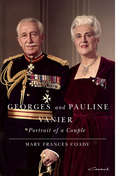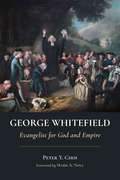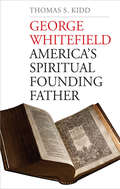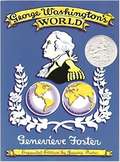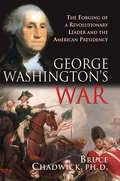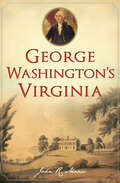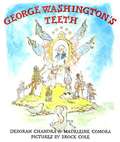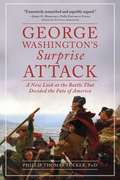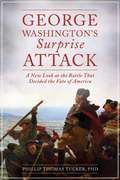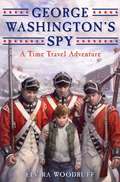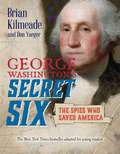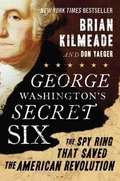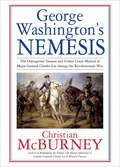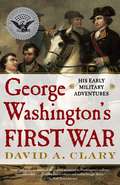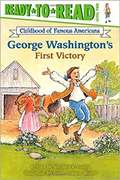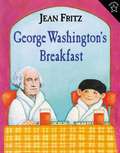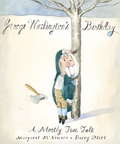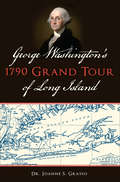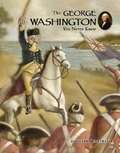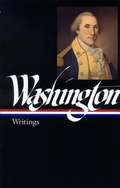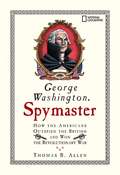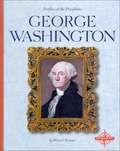- Table View
- List View
Georges and Pauline Vanier
by Mary Frances CoadyGeorges and Pauline Vanier follows their lives and travels across the world - from Canadian military life to the League of Nations, from the inner circles of British government to their harrowing escape from Nazi-occupied France - detailing their disappointments and triumphs during social and political turbulence. With insight and sympathy, Mary Frances Coady tells their dramatic personal story. Revealing their remarkably vibrant personalities, she details the couple's support of the French resistance as well as Georges Vanier's pleas for the Canadian government to accept refugees fleeing Hitler's horrors and his effort to broaden immigration policy. She also recounts the importance of their religious convictions, their controversial standing among Quebecers, and their early advocacy of official bilingualism. An invigorating and well-told tale of their lasting legacies, Georges and Pauline Vanier is the definitive account of the enduring contributions the Vaniers made to the world and to their country.
Georges and Pauline Vanier: Portrait of a Couple (Footprints Series #15)
by Mary Frances CoadyGeorges and Pauline Vanier follows their lives and travels across the world - from Canadian military life to the League of Nations, from the inner circles of British government to their harrowing escape from Nazi-occupied France - detailing their disappointments and triumphs during social and political turbulence. With insight and sympathy, Mary Frances Coady tells their dramatic personal story. Revealing their remarkably vibrant personalities, she details the couple's support of the French resistance as well as Georges Vanier's pleas for the Canadian government to accept refugees fleeing Hitler's horrors and his effort to broaden immigration policy. She also recounts the importance of their religious convictions, their controversial standing among Quebecers, and their early advocacy of official bilingualism. An invigorating and well-told tale of their lasting legacies, Georges and Pauline Vanier is the definitive account of the enduring contributions the Vaniers made to the world and to their country.
George Whitefield: Evangelist for God and Empire (Library of Religious Biography (LRB))
by Peter Y. ChoiNarrates the drama of a famous preacher&’s entire career in his historical contextGEORGE WHITEFIELD (1714–1770) is remembered as a spirited revivalist, a catalyst for the Great Awakening, and a founder of the evangelical movement in America. But Whitefield was also a citizen of the British Empire who used his political savvy and theological creativity to champion the cause of imperial expansion. In this religious biography of &“the Grand Itinerant,&” Peter Choi recounts a fascinating human story and, in the process, reexamines the Great Awakening and its relationship to a fast-growing British Empire.
George Whitefield: Evangelist for God and Empire (Library of Religious Biography (LRB))
by Peter Y. ChoiNarrates the drama of a famous preacher&’s entire career in his historical contextGEORGE WHITEFIELD (1714–1770) is remembered as a spirited revivalist, a catalyst for the Great Awakening, and a founder of the evangelical movement in America. But Whitefield was also a citizen of the British Empire who used his political savvy and theological creativity to champion the cause of imperial expansion. In this religious biography of &“the Grand Itinerant,&” Peter Choi recounts a fascinating human story and, in the process, reexamines the Great Awakening and its relationship to a fast-growing British Empire.
George Whitefield
by Thomas S. KiddIn the years prior to the American Revolution, George Whitefield was the most famous man in the colonies. Thomas Kidd’s fascinating new biography explores the extraordinary career of the most influential figure in the first generation of Anglo-American evangelical Christianity, examining his sometimes troubling stands on the pressing issues of the day, both secular and spiritual, and his relationships with such famous contemporaries as Benjamin Franklin, Jonathan Edwards, and John Wesley. Based on the author’s comprehensive studies of Whitefield’s original sermons, journals, and letters, this excellent history chronicles the phenomenal rise of the trailblazer of the Great Awakening. Whitefield’s leadership role among the new evangelicals of the eighteenth century and his many religious disputes are meticulously covered, as are his major legacies and the permanent marks he left on evangelical Christian faith. It is arguably the most balanced biography to date of a controversial religious leader who, though relatively unknown three hundred years after his birth, was a true giant in his day and remains an important figure in America’s history.
George Washington's World
by Genevieve Foster Joanna FosterFoster's telling of the life story of George Washington does justice to the man it celebrates.
George Washington's War: The Forging of a Revolutionary Leader and the American Presidency
by Bruce ChadwickDrawing on archival and other sources, Chadwick (American history, Rutgers U.) offers a new perspective on the well-known story of the plight of General Washington and his men at Valley Forge. He argues that the future president developed a model of leadership for dealing with national emergencies when he campaigned to secure emergency supplies for his troops. Includes period illustrations. Annotation ©2004 Book News, Inc., Portland, OR (booknews.com)
George Washington's Virginia (History And Guide Ser.)
by John R. MaassGeorge Washington slept, worked, and fought here . . . A historian&’s guide to Virginia sites and landmarks associated with the Founding Father. Born in the Tidewater region, George Washington was reared near Fredericksburg and took up residence at Mount Vernon along the Potomac River. As a young surveyor, he worked in Virginia&’s backcountry. He began his military career as a Virginia militia officer on the colony&’s frontier. The majority of his widespread landholdings were there—and his entrepreneurial endeavors ranged from the swamplands of the Southeast to the upper Potomac River Valley. In this book, historian John R. Maass explores the numerous sites all over the Commonwealth associated with Washington—and demonstrates their lasting importance. Includes photos and illustrations
George Washington's Teeth
by Deborah Chandra Madeleine Comora Brock ColeThe creators of George Washington's Teeth unhinge the jaws of history to examine the mouth of America's first president, tracking the poor man's dental woes as he gallops to war, crosses the Delaware, and, with only two teeth left, takes his place as leader of the country. Washington was plagued by black, rotting teeth from the time he was 22, losing about one a year until he was nearly "toofless" and had to have his first dentures made from a hippotamus tusk (that's right, not wood!). Poets Deborah Chandra and Madeleine Comora begin their quirky historical tale at a lively clip: "The Revolutionary War/ George hoped would soon be won,/ But another battle with his teeth/ Had only just begun..." Indeed. Evidently he was losing teeth even as he crossed the Delaware: "George crossed the icy Delaware/ With nine teeth in his mouth./ In that cold and pitchy dark,/ Two more teeth came out!" (Cleverly, illustrator Brock Cole mimics Emanuel Leutze's famous painting "Washington Crossing the Delaware," making Washington seem more uncomfortably tight-lipped than dignified.) The story ends happily ever after with the crafting of a nice new pair of ivory false teeth that allow George to dance around the ballroom through the night. Truth be told, however, he would be deeply troubled by his teeth until the day he died. A four-page, illustrated historic timeline of Washington's life (and mouth) completes this carefully researched, very funny, charmingly illustrated picture book that works to humanize a larger-than-life historical figure and in turn, history itself. Brilliant! (Ages 7 and older) --Karin Snelson
George Washington's Surprise Attack: A New Look at the Battle That Decided the Fate of America
by Phillip Thomas TuckerExtensively researched and superbly argued in Tucker’s compelling narrative, this in-depth examination of George Washington’s 'military miracle’ at the Battle of Trenton unquestionably confirms the vital importance of that stunning victory.” -Jerry D. Morelock, PhD, editor in chief at Armchair GeneralLike many historical events, the American Revolution is sometimes overlooked, ignored, or minimized by historians because of common shrouding in romantic myth or interference from stubborn stereotypes. Here historian Phillip Thomas Tucker provides an in-depth look at the events of the Battle of Trenton, weeding out fiction and legend and presenting new insights and analysis. Stories from many forgotten individuals of the war, including officers and soldiers from both sides, bring to life the Continental Army’s desperate circumstances and shocking victory. Myths that Tucker debunks include the Hessians’ slovenly drunkenness, Washington acting alone in creating the attack strategy, and Rall’s incompetence as a leader largely contributing to his troops’ defeat.By exploring the forgotten aspects of one of America’s most famous battles, revealing Trenton’s story proves to be even more fascinating. In the end, America’s founding was nothing short of miraculous, and no chapter of America’s story was more miraculous than Washington’s improbable success at the battle of Trenton, where America’s fate was decided to almost everyone’s amazement on a dark, snowy morning.Skyhorse Publishing, as well as our Arcade imprint, are proud to publish a broad range of books for readers interested in history--books about World War II, the Third Reich, Hitler and his henchmen, the JFK assassination, conspiracies, the American Civil War, the American Revolution, gladiators, Vikings, ancient Rome, medieval times, the old West, and much more. While not every title we publish becomes a New York Times bestseller or a national bestseller, we are committed to books on subjects that are sometimes overlooked and to authors whose work might not otherwise find a home.
George Washington's Surprise Attack
by Phillip Thomas TuckerLike many historical events, the American Revolution is sometimes overlooked, ignored, or minimized by historians due to being shrouded in romantic myth and stubborn stereotypes. Here historian Phillip Thomas Tucker provides an in-depth look at the events of the Battle of Trenton, weeding out fiction and legend and presenting new insights and analysis. Stories from many forgotten individuals of the war, including officers and soldiers from both sides, bring to life the Continental army's desperate circumstances and shocking victory. Myths that Tucker debunks include the Hessians' slovenly drunkenness, Washington acting alone in creating the attack strategy, and Rall's incompetence as a leader contributing widely to his troops' defeat.By exploring the forgotten aspects of one of America's most famous battles, Trenton's story proves to be even more revealing and fascinating. In the end, America's founding was nothing short of miraculous, and no chapter of America's story was more miraculous than Washington's improbable success at the battle of Trenton, where America's fate was decided to almost everyone's amazement on a dark, snowy morning.
George Washington's Spy: A Time Travel Adventure
by Elvira WoodruffA carefree autumn night takes a dangerous turn when six fifth-grade friends and a seven-year-old little sister find themselves mysteriously swept back in time to 1776--to the British occupation of Boston! The girls are taken in by a family of redcoat loyalists while the boys are recruited as patriot spies. As the children become embroiled in opposite sides of the war, they learn first-hand how ideological differences tore friends and families apart. Sprinkled with just enough humor, Elvira Woodruff has crafted an action-packed, highly dramatic sequel to her most popular book, George Washington's Socks.
George Washington's Secret Six (Young Readers Adaptation): The Spies Who Saved America
by Brian Kilmeade Don YaegerA page-turning middle-grade adaptation of the New York Times bestseller about George Washington's top-secret spy ring that helped defeat the British.The American Revolution is well under way in 1776, but things are looking bleak for General George Washington and his Continental Army. With Washington's hasty retreat from New York City in August, many think the war might soon be over. After all: how on earth is this ragtag group going to defeat its enemy, the well-trained and well-funded military of the largest empire in history? But Washington soon realizes he can't win with military might. Instead, he must outsmart the British, so he creates a sophisticated intelligence network: the top-secret Culper Spy Ring. Drawing on extensive research, Brian Kilmeade and Don Yaeger tell the fascinating stories of these long unrecognized spies: a reserved merchant, a tavern keeper, a brash young longshoreman, a curmudgeonly Long Island bachelor, a coffeehouse owner, and a mysterious woman.This vivid and accessible young readers adaptation of the New York Times bestseller features an exclusive new introduction, extensive back matter, and eye-catching art throughout. Chronicling a crucial moment in American history, this historical thriller will excite and inspire the next generation of patriots.
George Washington's Secret Six: The Spy Ring That Saved The American Revolution
by Brian Kilmeade Don Yaeger"As a Long Islander endlessly fascinated by events that happened in a place I call home, I hope with this book to give the secret six the credit they didn't get in life. The Culper spies represent all the patriotic Americans who give so much for their country but, because of the nature of their work, will not or cannot take a bow or even talk about their missions. "--Brian Kilmeade When General George Washington beat a hasty retreat from New York City in August 1776, many thought the American Revolution might soon be over. Instead, Washington rallied--thanks in large part to a little-known, top-secret group called the Culper Spy Ring. Washington realized that he couldn't beat the British with military might, so he recruited a sophisticated and deeply secretive intelligence network to infiltrate New York. So carefully guarded were the members' identities that one spy's name was not uncovered until the twentieth century, and one remains unknown today. But by now, historians have discovered enough information about the ring's activities to piece together evidence that these six individuals turned the tide of the war. Drawing on extensive research, Brian Kilmeade and Don Yaeger have painted compelling portraits of George Washington's secret six: Robert Townsend, the reserved Quaker merchant and reporter who headed the Culper Ring, keeping his identity secret even from Washington; Austin Roe, the tavern keeper who risked his employment and his life in order to protect the mission; Caleb Brewster, the brash young longshoreman who loved baiting the British and agreed to ferry messages between Connecticut and New York; Abraham Woodhull, the curmudgeonly (and surprisingly nervous) Long Island bachelor with business and family excuses for traveling to Manhattan; James Rivington, the owner of a posh coffeehouse and print shop where high-ranking British officers gossiped about secret operations; Agent 355, a woman whose identity remains unknown but who seems to have used her wit and charm to coax officers to share vital secrets. In" George Washington's Secret Six," Townsend and his fellow spies finally receive their due, taking their place among the pantheon of heroes of the American Revolution.
George Washington's Nemesis: The Outrageous Treason and Unfair Court-Martial of Major General Charles Lee during the Revolutionary War
by Christian McBurneyThis biography attempts to set the record straight for a misunderstood military figure from the American Revolution. Historians and biographers of Charles Lee have treated him as either an enemy of George Washington or a defender of American liberty. Neither approach is accurate; objectivity is required to fully understand the war&’s most complicated general. In George Washington&’s Nemesis, author Christian McBurney uses original documents (some newly discovered) to combine two dramatic stories to create one balanced view of one of the Revolutionary War&’s most fascinating personalities. General Lee, second in command in the Continental Army led by George Washington, was captured by the British in December, 1776. While imprisoned, he gave his captors a plan on how to defeat Washington&’s army as quickly as possible. This extraordinary act of treason was not discovered during his lifetime. Less well known is that throughout his sixteen months of captivity and even after his release, Lee continued communicating with the enemy, offering to help negotiate an end to the rebellion. After Lee rejoined the Continental Army, he was given command of many of its best troops together with orders from Washington to attack British general Henry Clinton&’s column near Monmouth, New Jersey. But things did not go as planned for Lee, leading to his court-martial for not attacking and for retreating in the face of the enemy. McBruney argues the evidence clearly shows Lee was unfairly convicted and had, in fact, done something beneficial. But Lee had insulted Washington, which made the matter a political contest between the army&’s two top generals—only one of whom could prevail.
George Washington's First War
by David A. Clary"I heard the bullets whistle, and, believe me, there is something charming in the sound." So said the young George Washington, something no veteran soldier would say. He had not been the target of enemy fire. Instead, he was papering over the fact that his men and Indian allies had just massacred a diplomatic party, setting off the French and Indian War of 1754-63. He had violated international law, something else he would not admit. Washington could, after all, tell a lie. That is but one revelation that acclaimed military historian and Washington expert David A. Clary offers in George Washington's First War. Washington spent his adolescence in military service, starting as a colonel in command at the age of twenty-two. He came from a society without a military tradition, and had no training or battle-wise sergeants to keep him out of trouble. He was a young glory hound thrust into circumstances he was not prepared to handle by elders who should have known better. Leading reluctant amateur soldiers against French professionals, when he took command he was on his own. Accordingly, Washington survived a five-year ordeal unlike that endured by any other Founding Father. He emerged from it not yet the steady supreme commander of the Revolution, but he had started on the road that led him to become the great soldier and statesman of his age. How he began his life's journey is what George Washington's First War is about. It is a dramatic story of frontier warfare played out against the anxieties and resentments of an ambitious adolescent. Here are accounts of harrowing ordeals in the wilderness, the decisive part played by the Indian nations whose continent this was, and the epic clash of empires. Others have looked at Washington's activities during the French and Indian War without recognizing that he played his part in that history during his painful transition from boy to man. His repeated blunders and defeats arose from his youthful impetuosity and inexperience and weak support from his government. Clary has a sound understanding of eighteenth-century wilderness warfare, and his descriptions of battles are vivid, exciting, and laced with horrifying details. Brought to dramatic life are Washington's harrowing wintertime journey into the wilderness to order the French to leave the territory, the Jumonville Massacre, his bloody defeat at Fort Necessity, his heroism at the Battle of the Monongahela (Braddock's Defeat), his years of frustration commanding the Virginia Regiment, the Forbes Expedition of 1758, his insubordination to civil and military superiors, and his resignation from the army. A revealing portrait of Washington during a crucial, formative period of his life, this is the indispensable backstory to the making of a great man.
George Washington's First Victory (Ready-To-Read COFA)
by Stephen KrenskyDescribes an incident in the early life of George Washington, which provides a glimpse of his relationship with his mother.
George Washington's Breakfast
by Jean FritzGeorge Washington Allen, a boy who never gives up until he finds out what he wants to know, is determined to learn all there is to know about his namesake.
George Washington's Birthday: A Mostly True Tale
by Margaret Mcnamara Barry BlittFrom award-winning author Margaret McNamara and New Yorker artist Barry Blitt comes this partly true and completely funny story of George Washington's 7th birthday. In this clever approach to history, readers will discover the truths and myths about George Washington. Did George Washington wear a wig? No. Did George Washington cut down a cherry tree? Probably not. Readers young and old who are used to seeing George Washington as an old man, will get a new look at the first president--as a kid. Perfect for classrooms, Presidents' Day, or as a birthday gift.From the Hardcover edition.
George Washington's 1790 Grand Tour of Long Island
by Dr. Joanne S. GrassoThe story of the first American president’s journey through Brooklyn, Queens, Nassau, and Suffolk, based on his own diary.After being elected president, George Washington set out to tour the new nation, which was desperate for a unifying symbol. He spent five days on Long Island in April 1790, an area recovering from seven years of devastating British occupation. Washington saw it all, from Brooklyn to Patchogue to Setauket and back. He was honored at each stop and wrote extensive diary entries about his impressions of the carriage stops for food and overnight stays at taverns and private homes, as well as his vision for the future of the region. In this book, historian Dr. Joanne S. Grasso traces this momentous journey.Includes maps and illustrations
The George Washington You Never Knew
by James Lincoln CollierExplores the childhood, character, and influential events that helped shape the life of the first American president.
George Washington - Writings
by George Washington John RhodehamelThis one-volume collection - the most extensive and authoritative ever published - covers five decades of Washington's astonishingly active life and brings together over 440 letters, orders, addresses, and other writings.
George Washington Williams: A Biography
by John Hope FranklinThis book traces Franklin's forty-year quest for Williams's story, a story largely lost to history until this volume was first published in 1985. The result, part biography and part social history, is a unique consideration of a pioneering historian by his most distinguished successor. Williams (1849-1891), had a remarkable career as soldier, minister, journalist, lawyer, politician, freelance diplomat, and African traveler, as well as a historian. While Franklin reveals the accomplishments of this neglected figure and emphasizes the racism that curtailed Williams's many talents, he also highlights the personal weaknesses that damaged Williams's relationships and career.
George Washington, Spymaster: How the Americans Outspied the British and Won the Revolutionary War
by Thomas B. AllenThe award-winning National Geographic book that presents the untold story of the invisible war behind the American Revolution. A riveting tale of intrigue, spies, counterspies and secret agents,George Washington, Spymaster is a unique and entertaining account of one of the most important chapters in our nation's history. The compelling narrative reveals the surprising role played by the first commander-in-chief, General George Washington in the War of Independence. Follow the action as 1775 dawns, and Washington finds himself in serious trouble. At war with Britain, the world's most powerful empire, his ragtag army possesses only a few muskets, some cannons, and no money. The Americans' only hope is to wage an invisible war_a war of spies, intelligence networks, and deception. Enter the shadowy world of double agents, covert operations, codes and ciphers_a world so secret that America's spymaster himself doesn't know the identities of some of his agents. Meet members of the elusive Culper Ring, uncover a "mole" in the Sons of Liberty, and see how invisible ink and even a clothesline are used to send secret messages. You can even use Washington's own secret codebook, published here for the first time. Experience at close quarters the successes and failures of the Americans as they strive to outwit the British. Meet the chief of covert operations, one Benjamin Franklin, and several other surprising players in America's secret war. Author Thomas B. Allen has sifted through dozens of historical documents and coded letters to uncover the facts about a time shrouded in secrets.
George Washington (Profiles of the Presidents)
by Michael BurganA biography discussing the personal life, education, and political career of the first President of the United States, George Washington.
